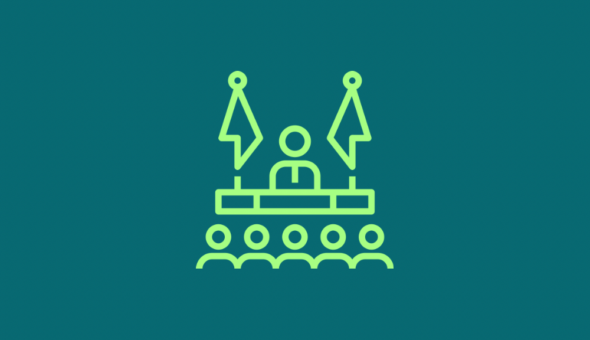Alim Baluch is Teaching Fellow in German Politics & Society at the University of Bath's Department of Politics, Languages & International Studies.
The big headlines after the federal election belong to the Alternative fuer Deutschland (AfD), making its first entry into the Bundestag with astonishing ease and earning more than 85 seats. Yet taking a long-term perspective on the German party system unearths an astonishing trend in which yesterday’s federal election can be regarded as a remarkable landmark.
In the 1950s, 60s and 70s, the Bundestag was the arena of 3 factions: the Christlich Demokratische Union Deutschlands (CDU)/Christlich-Soziale Union in Bayern (CSU), the Sozialdemokratische Partei Deutschlands (SPD) and the market-liberal Free Democrats (FDP). The three-party system (for the sake of simplicity, CDU and the more right-wing Bavarian sister party CSU will be treated as one party) was far from perfect. The smaller FDP was usually in the convenient position of a kingmaker without whose cooperation the two big Volksparteien (people’s parties) were not able to form a government. The most extreme manifestation of their kingmaker status was apparent in 1982, when the FDP, as part of a government coalition with the SPD, reached out to opposition leader Helmut Kohl and ultimately abandoned ship to prop up Kohl through instigating a vote of no confidence against Chancellor Schmidt. Without consulting the German electorate, the chancellorship was handed over from Schmidt to Kohl in one spectacular day (1 October 1982).
But to the dismay of the FDP, the Bundestag has changed dramatically since then. The Greens, a much derided anti-establishment force in the 1980s, entered the stage and, to the surprise of many, became a permanent fixture in the Bundestag. After the reunification, the Party of Democratic Socialism (PDS), risen from the ruins of the East German ruling party, turned the Bundestag into a five-party system. The PDS has now rebranded itself as Die Linke (the Left) following a merger with a West German party - and while the PDS was struggling to make it into the Bundestag in the 1990s, 21st century Die Linke has consistently overcome the 5% hurdle with ease.
Yesterday we witnessed the entry of the latest addition to the Bundestag. When the AfD emerged in 2013, it impressed with immediate polling success followed by remarkable entries into state parliaments. But many political analysts awaited their implosion before ever entering the Bundestag, particularly as their one issue, the European debt crisis, lost its salience. The AfD, despite its recent radicalisation from a soft Eurosceptic centre-right party to an anti-Islam, anti-refugee, anti-gender mainstreaming, anti-supranationalism and anti-political correctness party, does not show any sign of imploding and, regardless of political positions, a six-party parliament can bring Germany’s democracy to its knees.
With only four parties, as seen in 2013, it was already difficult to avoid a grand coalition of the big centre-left and centre-right parties. Given that none of the relevant parties failed to make it into the Bundestag, it becomes even harder to avoid the grand coalition. The larger the share of wasted party votes, the smaller the combined share of votes necessary to form a coalition becomes. Of course, there are always parties that fail to make it over the 5% hurdle. The result is that those parties that make it over the 5% have a larger share of seats than their share of party votes. In order to form a government with more than 50% of seats, it is often enough to have two parties representing a combined vote share of around 45%. However, if all relevant parties make it over the 5% while the two giants of German politics show signs of long-term decline, it becomes increasingly difficult to avoid a grand coalition.
While ahead of this election it was largely expected that the Christian Democrats could rule together with the FDP, Merkel’s hope was shattered given the disappointing result of the Conservatives. The SPD has, with slightly over 20%, achieved a new historic low – once again!
The SPD has been damaged by its association with the Christian Democrats for 12 out of the 17 years of this new millennium. The populist narrative which states that “they are all the same” is toxic for the junior partner of a grand coalition, particularly when the populists have a point. While Merkel has skilfully absorbed Social Democratic talking points and liberal positions, and even ripped the threat of nuclear energy out of the arms of the Greens after her Fukushima U-turn resulted in the decommissioning of all nuclear power plants, the SPD has consistently failed to compete with her for the same centre ground - and a German Corbyn or Sanders, who could at least bring back the alienated left who remember Schröder in very unfavourable terms, is nowhere to be seen. Too distracted was the SPD to distance itself from the word socialism and rule out any coalition with Die Linke on the federal level. As with pre-Corbyn Labour, the SPD lost much of its credibility among the Left. Its election campaign rhetoric is as empty as Merkel’s while Germany’s sizeable precarious workforce still blames Gerhard Schröder for “reforming” the labour market, the welfare system and the pension system into the ground to make Germany more competitive in a globalising world. If the SPD wants to win with the same old centrist politics, it will take an extraordinarily charismatic politician to pull off a comeback. But given the large party decline as the long-term trend of the German party system, it will be difficult for them to stay out of toxic coalitions with the Conservatives - particularly if coalitions with Die Linke keep being ruled out.
In the 20th century, the Bundestag saw only three disastrous years of grand coalition (1966-69). In the 21st century the grand coalition is the new normal (2005 – 2009; 2013 – today). As it seems today, the so-called Jamaica coalition (Christian Democrats, FDP and Greens) is the only viable alternative to the grand coalition. The SPD is so weak that not even a coalition with two smaller parties would be enough for a majority. The once proud party needs to re-connect with electorate and stop ruling out coalitions with Die Linke. Without alternative 3-party coalitions, Germany is en route to become the new Austria, with endless grand coalitions eroding trust in the political establishment. Even if Merkel can pull off Jamaica in the coming weeks, which is a big if, such a ménage à trois will be difficult to maintain.
Respond




